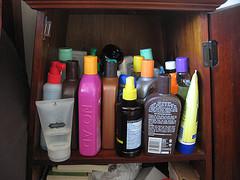 After decades of debate, the FDA has finally released guidelines for sunscreen products that will help protect consumers against both sunburn — caused by ultraviolet B rays, and skin cancer and aging — caused by more dangerous ultraviolet A rays. The guidelines also set limits on acceptable sun protection factor (SPF) levels.
After decades of debate, the FDA has finally released guidelines for sunscreen products that will help protect consumers against both sunburn — caused by ultraviolet B rays, and skin cancer and aging — caused by more dangerous ultraviolet A rays. The guidelines also set limits on acceptable sun protection factor (SPF) levels.
New regulations will require manufacturers to specifically address whether or not their products block both UVA and UVB rays. The new buzzword from the FDA is “broad spectrum” to describe sunscreen that blocks both. They also require manufacturers to market sunscreens with a SPF rating of at least 15, but less than 50, unless they have data to substantiate a higher number. ”These changes to sunscreen labels are an important part of helping consumers have the information they need so they can choose the right sun protection for themselves and their families,” said Dr. Janet Woodcock, director of FDA’s drug division. The majority of consumers are not aware that most sunscreens on the market today are designed to only prevent sunburn by blocking out UVB rays, while affording little to no protection against UVA rays. The FDA is hoping that this will soon change.
Malignant melanoma, the most deadly form of skin cancer, is diagnosed each year in over 65,000 Americans, resulting in almost 9,000 deaths. Dermatologists recommend that in order to prevent melanoma and the other ravaging effects of exposure, sunbathing enthusiasts should apply a sunscreen that is “broad spectrum” and with a SPF of 30 or greater every two hours. The FDA is also banning sunscreen claims such as “sweatproof” and/or “waterproof”, which the agency says are “exaggerations of performance.”
Starting in 2012, if a sunscreen product does not protect against both UVA and UVB rays, or if the sun protection factor is below 15, then it must have a disclaimer which reads “This product has been shown only to help prevent sunburn, not skin cancer or early skin aging.” In order to be compliant, some manufacturers, such as Coppertone and Neutrogena, already have labels that read “broad spectrum UVA and UVB protection.”
Whether you’re spending the day at the beach or taking a ten minute walk in the sun, take the necessary precautions to protect your skin.

